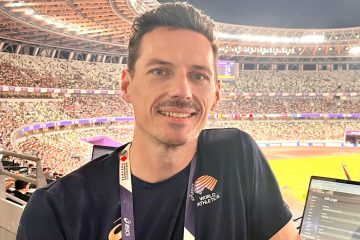21 Questions With… Daniel Trainor

We’re delighted to welcome Daniel Trainor – creator and host of the ‘Same Team’ podcast – for our latest sports media Q&A…
Our ’21 Questions With…’ feature catches up with individuals in sports media whose work covers LGBT+ people in sport, to learn more about them, their careers, and why the topic is important to them. So far, we’ve heard from Daily Cannon editor and Guardian opinion writer Lee Hurley, who lives in Belfast, and BBC broadcast journalist Jack Murley, based on Jersey in the Channel Islands and the brains behind The Other Side. Thanks to both for sharing their experiences.
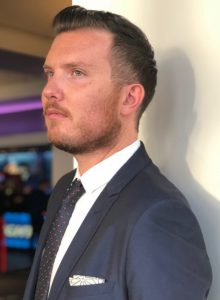
Now – for the first time – we’re heading outside the UK, to Los Angeles, to meet Daniel Trainor, who launched the podcast Same Team back in June. Same Team is a series of one-on-one conversations with influential LGBTQ athletes, journalists and personalities – each episode digs deeper into the subject’s background, achievements and hopes for the future. Guests so far have included Outsports editor Cyd Zeigler; WEEI radio in Boston’s Alex Reimer, host of the Two Outs pod; Jessica Platt, the first trans player in the Canadian Women’s Hockey League; an in-depth two-parter with pro wrestler Mike Parrow; and former Kentucky football player Landon Foster. We thoroughly recommend having a listen if you haven’t happened across Same Team before, particularly if you’re keen to learn more about the differences between LGBT+ inclusion in North American sport and here in the UK. All the installments are thoroughly accessible and revealing, and also cover many associated angles to the central theme.
On each episode, Daniel reveals a little about his own story and interests but here at Sports Media LGBT+, we wanted to find out what inspired him to start the pod, and also his own journey in the industry to date.
So it’s time to turn the tables and ask Daniel some questions…
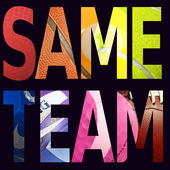
1. What inspired you to start the ‘Same Team’ podcast?
I wanted to start Same Team to provide a space for LGBTQ athletes, journalists and other prominent figures to tell their stories. Growing up as a gay sports fan, I wasn’t really sure where I fit into the landscape, or if I really even fit in at all. Hopefully the podcast is an outlet for people to teach and inspire others, while having some fun along the way. I would have loved to have heard a gay sports podcast when I was younger, so I try and keep that in mind during every episode. I want those in the LGBTQ community to know that they can be heard, accepted and supported in the sports world.
2. What’s been the most enjoyable aspect of doing the pod so far?
It’s really been a pleasure getting to know people on a personal level. Cyd Zeigler, founder of Outsports and a personal hero of mine, was kind enough to invite me over to his home for the first episode. I have been so pleased with the level of honesty that every interview subject has shown thus far. There really seems to be a desire to inspire a younger generation or anybody going through their own journey, which is so cool. I’ve learned so much already and it’s exciting to think about all of the ground there still is to cover.
I’m excited to announce the arrival of my new podcast, Same Team! The show will feature influential LGBTQ figures discussing their journeys. The first episode is highlighted by an interview with @CydZeigler, co-founder of @outsports. https://t.co/SFqEPX3ryr
— Daniel Trainor (@dantrainor1) June 27, 2018
3. How do you feel the pod has been received, by listeners and by the guests themselves?
The response has been really exciting so far. When I launched, I was really flying by the seat of my pants. I was a real technological novice with little audio editing experience, so I was nervous about a bunch of different things. I think the podcast has improved with each episode. Constructive criticism has been a big help, which is something I think you have to seek out if you’re going to start from scratch like this. It’s been so fun seeing the podcast grow and, with it, the audience. I love seeing what aspects of each episode certain people respond to. I think the most rewarding reaction I’ve received thus far is from my interview with Jessica Platt, the first transgender woman to play in the Canadian Women’s Hockey League. Many people responded to well to our discussion about the hormone therapy that impacted her athletic ability. It’s been great having those conversations that aren’t really being held elsewhere. I think that’s when the podcast operates best.
4. What’s your favourite sporting memory?
Last year, I had the opportunity to go the final game at Joe Louis Arena in Detroit with my Dad. As a die-hard, lifelong fan of the Detroit Red Wings, it was the culmination of so many things at once. Joe Louis Arena was more than just a place for me. I had been to countless games there over the years, had the pleasure of working there during my time with Fox Sports Detroit and created so many incredible memories with friends and family alike. Being there for the final game was as emotional as it was thrilling. Being there side by side with my dad, who I’ve shared my Red Wings fandom with for my entire life, made it even more special.
Goodbye, old friend. pic.twitter.com/d08NW4eIcW
— Daniel Trainor (@dantrainor1) April 10, 2017
5. Who are your top three icons in sport…
Steve Yzerman, Serena Williams, and Finn Balor.
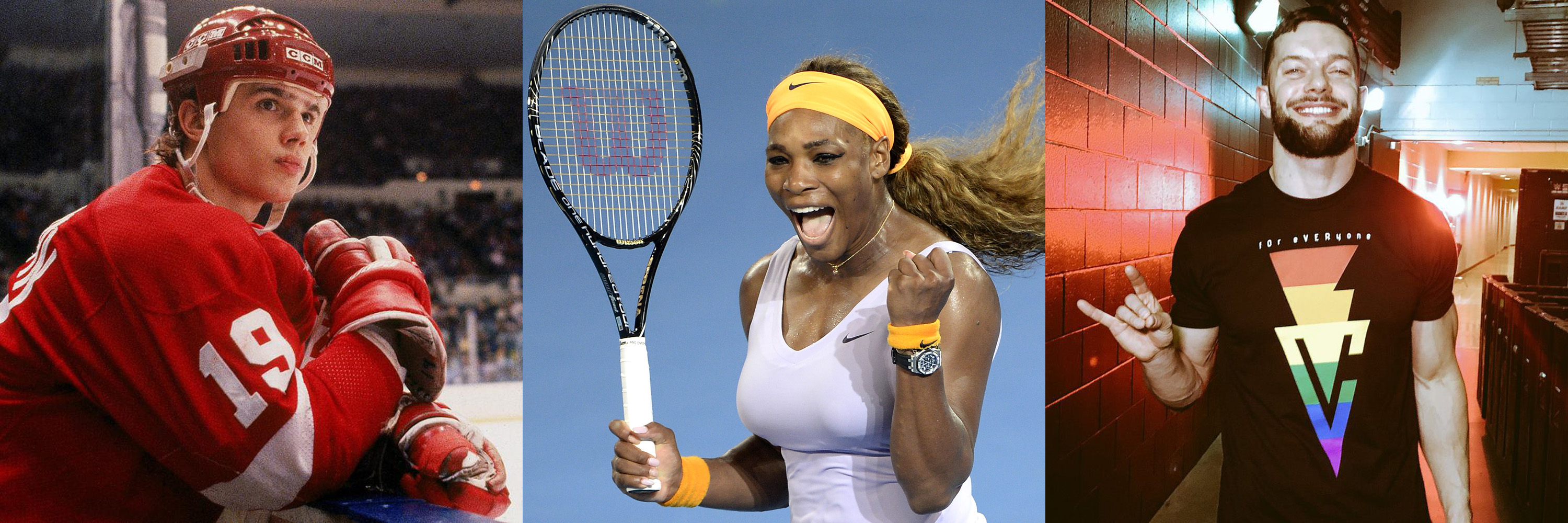
6. … and why?
As a Red Wings fan who grew up in the 90s, there’s really nobody else like Steve Yzerman. He embodied everything it meant to be a leader and a role model. He was a superstar without ever acting like one. I have great hope that he still has one more chapter in Detroit before all is said and done.
It’s easy to point to Serena Williams’ on-court prowess, but I admire her just as much for the person that she is off the court. To be the most dominant athlete in your sport for the better part of two decades is no easy burden, especially as an African-American woman, and she has handled it all with such strength and integrity. As a mother, she hasn’t been afraid to show her vulnerability, which I think is as inspiring as anything.
Not only is he one of the best in-ring performers in the world, but Finn Balor’s LGBTQ advocacy is also unprecedented in the world of professional wrestling. At WrestleMania 34, he made his entrance decked out in rainbow gear surrounded by members of the LGBTQ community of New Orleans, where the event was being held. As a straight ally, his support perhaps means even more, especially in a sport where masculinity and toughness can be valued above all else.
7. What’s your background with regards to sports media?
I studied journalism at Michigan State University, with an emphasis on sports journalism. I worked for the athletic communications department at MSU for three years, acting as a student media liaison between the media and the athletic department. I interned at Fox Sports Detroit during my senior year, which led to a job as a production assistant there post-graduation. I stayed there for two years before transitioning more into the entertainment sphere in Los Angeles.
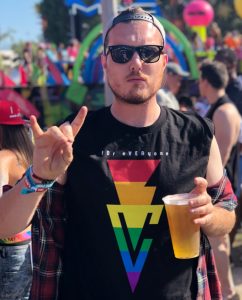
8. Whether in sports media or just general podcasting, who do you admire and how do they influence you?
The aforementioned Cyd Zeigler has always been a huge influence. Outsports has been a crucial space for LGTBQ stories to find the light of day and its impact cannot be understated. When it comes to podcasts, I’m a fan of people who unabashedly embrace what makes them unique. I’m a big comedy and improv fan, as well, so I love podcasts like Las Culturistas and Seek Treatment, which succeed because their hosts aren’t afraid to run from their specific senses of humor. I also love Hollywood Handbook, Bitch Sesh and Wrestling Sheet Radio.
9. What advice would you give to someone who wanted to start up their own sports podcast, perhaps for a topic that might be considered more ‘niche’?
The biggest thing is just to… start. I had absolutely no idea what I was doing at the beginning (some would argue that I still don’t), but I pushed forward with the knowledge that it didn’t have to be perfect. I had very little audio editing experience, no idea how to use a mixer and microphones and no real plan for promotion. Once you start picking away at it, though, the ball starts rolling.
It’s also been really great to see how many people have been willing to contribute and participate. There’s no shame or harm in reaching out to potential guests, especially if it’s a podcast with a specific, positive focus. Guests have been very willing to tell their stories, which is why the podcast succeeds in the first place.
10. What’s been your proudest career moment to date?
In many ways, the launch of the podcast felt like the culmination of everything that had come before. It was something I had been wanting to do for a long time. The feedback I received from peers and others within the LGBTQ community was so fulfilling and gratifying.
The show will release weekly and highlight a different LGBTQ athlete, journalist or person of prominence every episode, discussing the complexities and importance of their missions. I am extremely proud of this project and I would be so grateful for your support. Thanks so much!
— Daniel Trainor (@dantrainor1) June 27, 2018
11. What obstacles have you encountered?
Working in sports, and sports media more specifically, is a straight man’s game. I never quite felt safe or respected by all of my colleagues, which makes it incredibly difficult to grow and flex your muscles. I’ve had bosses call me “gay” to my face, respected veterans throw around the word “faggot” and become so accustomed to derogatory discussions about the LGBT community that they felt commonplace. It’s a huge struggle to persevere and make a name for yourself in a world that doesn’t respect you. I think (and hope!) that things have gotten better, but there’s still a very long way to go.
12. How do you try to maintain a healthy work-life balance?
Producing a podcast that is outside of your regular job schedule can be tough. It’s all about finding the time. Between scheduling, editing and promoting, there’s a lot that goes into it. If you don’t have the motivation to balance it all, it probably means you aren’t passionate enough about it. I’ve had to get creative with my time, from waking up early to edit, or recording stuff in my car.
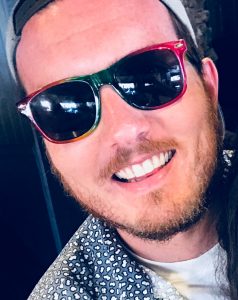
13. How, if at all, has being gay been a factor in pursuing your ambitions in sports media?
It’s been a big factor. Like I said, I absolutely feel like it’s been detrimental in certain situations. The respect level just isn’t the same for LGBTQ people in many sports media environments, which is part of the reason I wanted to start the podcast. Instead of wilting, it’s important that we feel empowered and confident enough to stand up and assert the fact that we deserve to be here.
14. As an industry, how would you generally assess the US media / sports media on making efforts towards improved LGBT+ inclusion?
I think things have dramatically improved over recent years, but there’s a very long way to go. There’s still a severe lack of LGBTQ representation on television. As the reality of LGBTQ athletes in major sports continues to come into focus, it’s important that the voices and faces behind the games themselves start to follow suit.
15. In your use of social media with regards to discussions around being LGBT+ in sport, what’s your general assessment of the interaction with other users?
I have literally only had one negative comment thrown my way about the podcast. All of the feedback has been incredibly positive, which has been wonderful. Many of my straight friends in places of prominence in sports media have helped me to promote it and that’s been such a thrill. The podcast is obviously a little niche, but it’s really cool to see non-LGBTQ people finding it, as well.
16. In your local community or region, what evidence do you see of social attitudes towards LGBT+ people, whether positive or negative?
Living in Los Angeles is very much a blessing when it comes to progressive attitudes and mindsets. It can be easy to forget sometimes that things aren’t as easy everywhere else. I’m originally from the Midwest, where things aren’t as straightforward, but I do think they’ve really started to improve. The beauty of the podcast is that I have the opportunity to chat with people from all different places and from various walks of life. Hearing about what it’s like to grow up gay in suburban Nashville or transgender in small-town Canada is not only eye-opening, but hopefully can help people in similar circumstances.
This week’s episode features Part 1 of a conversation with @Parrow_, who talks about being a gay professional wrestler during the sport’s renaissance, his origin as a collegiate football player and the importance of people like @FinnBalor. https://t.co/Xba19dR5gy
— Daniel Trainor (@dantrainor1) July 23, 2018
17. What signs do you see that sports in the US are becoming more welcoming for lesbian, gay, bisexual and transgender people?
Since I started the podcast, athletes in college football, MLS and professional golf have come out of the closet. That’s only been in the last few months! Things are changing and it’s really cool. From all of the athletes and journalists that I’ve spoken to about coming out while in the public eye, they’ve all reported very little negative feedback. This isn’t to say that it still isn’t an incredibly brave act, but it’s been so great to hear story after story about people having mostly positive experiences.
18. Whose stories have had the greatest impact on you, in terms of LGBT+ representation in sport?
I really enjoyed having the chance to chat with Jessica Platt, the first openly transgender player in the Canadian Women’s Hockey League. Many strides have been made recently regarding trans athletes and it was informative and inspiring hearing about Jessica’s journey.
I also really enjoyed talking to Landon Foster about the struggles he had with his sexuality as a punter at the University of Kentucky. It was the first time I had really heard a story like his, detailing the intensity of coming out of the closet as a student-athlete.
19. What’s your recommendation for… a movie or TV show?
If anybody hasn’t seen Andrew Haigh’s ‘Weekend’ from 2011, make a point to do so. It’s a beautiful, intimate look at two gay men who spend a brief amount of time together and how incredible and delirious that can be. I still think about it all the time.
20. … a book?
‘Beartown‘ by Fredrik Backman. It’s about a small-town ice hockey community and features a gay player. What more do you need to know?
21. … a destination (travel, event, etc)?
I always tell people to take a vacation to Detroit. It’s often met with skepticism, but Detroit is one of the coolest, most vibrant cities in America. Obviously I’m a little biased, but there’s so much culture and energy in the city right now. It’s worth a shot.
https://www.instagram.com/p/BTSjX4kA5ui
Our immense gratitude to Daniel for taking the time to talk to us – follow him on Twitter at @dantrainor1. You can listen to ‘Same Team’ on iTunes or on Soundcloud.
Interested in participating in our ‘21 Questions With…‘ feature? Or just keen to learn more about our network? Drop us an email at info@sportsmedialgbt.com – we’d love to hear from you.
